Mole Checks London
Home » Treatments » Mole Checks London
Moles Can Be Malicious
Not sure about your condition? Get in touch now, there is no reason for you to wait.
Award winning dermatology service, with over 20 years of experience
Short waiting lists, on some occasions offering same week appointments
Safe environment, in Care Quality Commission approved facilities
MOLE CHECKS & SKIN CANCER SCREENING IN LONDON
Skin cancer is the most common type of cancer in the UK and is often linked to prolonged exposure to harmful UV rays from the sun or artificial sources like tanning beds. This makes regular skin examinations, including mole checks in London, essential for maintaining your skin health. Early detection not only offers peace of mind but can also dramatically improve treatment outcomes.
Our highly experienced team of skin cancer specialists conducts detailed evaluations to identify any potential issues at the earliest stage. If you’re searching for mole checks near you, we’re here to provide expert care and guidance tailored to your needs. Detecting skin cancer early can lead to simpler, more effective treatments and, ultimately, save lives. Make your skin health a priority today.
MOLE Check Procedure
During a mole check procedure, a dermatologist carefully examines your skin to identify any unusual or concerning features. The process typically begins with a discussion about your medical history, including any personal or family history of skin cancer, as well as any changes in your skin that you may have noticed. Following this, the dermatologist will perform a thorough visual inspection of your skin, using a specialised tool called a dermatoscope. This device allows for a magnified and illuminated view of moles and other skin lesions, enabling the dermatologist to detect subtle abnormalities. If a mole appears suspicious, a biopsy may be recommended, where a small sample of the tissue is removed and sent to a laboratory for further analysis. This comprehensive and precise approach ensures any issues are identified early, allowing for prompt and effective treatment.
SINGLE MOLE CHECK
At The Harley Street Dermatology Clinic, we’re here to support you if you’re concerned about a specific mole. During your initial single mole check, a specialist will assess the mole using a dermascope. If the mole appears suspicious of skin cancer, we can arrange a rapid initial consultation for further investigation. If you’re worried about more than one mole, we recommend a full-body mole check or mole mapping for a comprehensive assessment.
FULL BODY MOLE CHECK
If you have multiple moles on your body that you would like to be checked by an expert, book a full body mole check at the Harley Street Dermatology Clinic with a consultant dermatologist. Your moles will be assessed and if your consultant is concerned with any of them and they require further investigation or treatment, this will be discussed with you. Our dermatologists are highly qualified consultants who are all members of the British Association of Dermatologists, the Royal Society of Medicine, the General Medical Council and the Royal College of Physicians
FULL BODY MOLE MAPPING
The Harley Street Dermatology Clinic offers an advanced system for full body mole mapping. The innovative DermEngine technology provides a permanent record of your skin and moles, allowing any changes to be quickly identified and investigated. During the procedure, detailed photos of individual moles are taken and analysed by a consultant dermatologist, who then maps and records them all. This system allows subtle changes in moles to be easily highlighted, making it an accurate tool in detecting skin cancer. Once complete, patients are furnished with their own copy of the images to review whenever necessary.

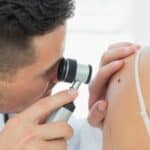
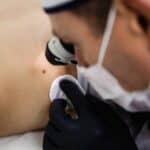
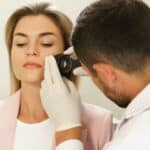
FREQUENTLY ASKED QUESTIONS
WHEN SHOULD I GET MY MOLES CHECKED?
We strongly recommend scheduling an annual review of your moles to monitor for any changes that may have occurred since your last visit. For individuals at a higher risk of developing skin cancer, more frequent check-ups may be necessary to ensure thorough and proactive care. To make this process easier, we will send you a reminder to book your annual appointment. However, if you notice any changes to your moles between your scheduled appointments — such as alterations in size, shape, color, or texture — please do not hesitate to contact us promptly to arrange a mole check. Early detection is key to effective treatment and peace of mind.
WHAT HAPPENS IF I HAVE A PRECANCEROUS MOLE?
If your mole is identified as precancerous, it means that the cells within the mole have the potential to develop into skin cancer if left untreated. The treatment for a precancerous mole typically involves a straightforward procedure in which the mole is removed, often under local anaesthesia. This is a minimally invasive and generally quick process designed to prevent further development into a more serious condition.
After the mole is removed, it will usually be sent to a laboratory for further analysis to confirm the diagnosis and ensure all cells have been excised. We will keep you informed of these results and discuss any necessary follow-up care. By addressing precancerous moles early, we can significantly reduce the risk of complications and support your overall skin health.
HOW DO I KNOW WHICH MOLE CHECK IS RIGHT FOR ME?
It depends on your circumstances, family history and background. We recommend that you speak to one of our experts and they can suggest the best form of treatment for you.
HOW CAN I CHECK MY OWN MOLES?
Regularly checking your moles at home is an important step in monitoring your skin’s health.
Use the ABCDE method as a guideline to assess moles for any concerning changes:
- A – Asymmetry: Look for moles where one half does not match the other in shape or size.
- B – Border: Check for edges that are uneven, blurred, or irregular.
- C – Colour: Be mindful of moles with multiple colours or an unusual appearance, such as shades of red, white, blue, or black.
- D – Diameter: Pay attention to moles larger than 6mm across, roughly the size of a pencil eraser.
- E – Evolving: Notice any changes in size, shape, colour, or texture over time, as well as symptoms like itching or bleeding.
Performing regular self-examinations in a well-lit environment, using a mirror or enlisting a partner to view hard-to-see areas, can help you spot potential concerns early. If you notice any changes or have doubts, it is essential to consult a healthcare professional promptly. Prioritising early detection is key to maintaining healthy skin.
MOLE SERVICES WE PROVIDE:
Moles treatment prices
HEAR FROM OUR PATIENTS
Start Your Journey With Us
Please fill in this form and one of our team will give you a call back to arrange a consultation with one of our expert dermatologists.
WHY GET YOUR MOLES CHECKED AT THE HARLEY STREET DERMATOLOGY CLINICS, London?
The Harley Street Dermatology Clinics in London are renowned for their expert care, state-of-the-art facilities, and patient-centred approach. Specialising in early detection and treatment of skin conditions, their team of highly qualified consultants and dermatologists utilise advanced diagnostic tools to provide thorough mole assessments.
Choosing the Harley Street Dermatology Clinics ensures you receive a comprehensive examination in a professional and empathetic environment. Early detection is critical when it comes to skin health, and their expertise in identifying potential issues, such as melanoma or other skin irregularities, offers peace of mind. With flexible appointment options and the reassurance of cutting-edge technology, our clinic delivers the highest standard of care tailored to your needs. Prioritising your skin health at Harley Street can make a vital difference in addressing concerns swiftly and effectively.
MOLE CHECKING INSIGHTS AND ADVICE
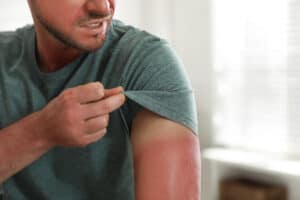
Ask The Expert: Sun Damage
WHAT DO I DO IF I BURN MY SKIN? Ideally, with the right high SPF sun cream and caution, sunburn can be avoided completely. However, in cases where sunburn happens, it is important to begin treating as soon as possible and get out of the
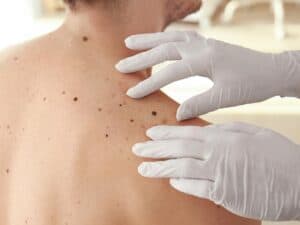
Worried about a mole?
A mole is a coloured spot on the skin which is made up of a cluster of cells known as melanocytes which are responsible for producing the pigment in your skin. Sometimes these melanocytes grow in a cluster instead of being spread out which results
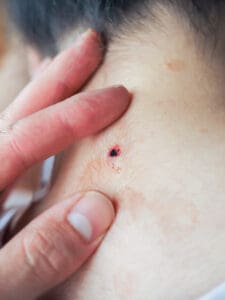
When Should I Worry About a Mole?
Moles are usually harmless, but these small dark spots on our skin can sometimes develop into a type of skin cancer known as melanoma. Melanoma can be very serious if it isn’t spotted and treated quickly, so it is important to keep a close eye











